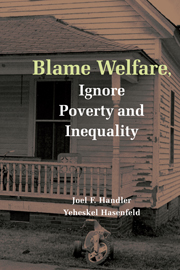Book contents
- Frontmatter
- Contents
- Acknowledgments
- List of Acronyms
- 1 Introduction
- 2 The State of Poverty: TANF Recipients
- 3 The Response to Poverty and Inequality: The Welfare State
- 4 Demonizing the Single-Mother Family: The Path to Welfare Reform
- 5 The Welfare Bureaucracy
- 6 Work and the Low-Wage Labor Market: Mothers and Children
- 7 Welfare Reform and Moral Entrepreneurship: Promoting Marriage and Responsible Parenthood and Preventing Teenage Pregnancy
- 8 Addressing Poverty and Inequality
- References
- Author Index
- Subject Index
5 - The Welfare Bureaucracy
Published online by Cambridge University Press: 20 August 2009
- Frontmatter
- Contents
- Acknowledgments
- List of Acronyms
- 1 Introduction
- 2 The State of Poverty: TANF Recipients
- 3 The Response to Poverty and Inequality: The Welfare State
- 4 Demonizing the Single-Mother Family: The Path to Welfare Reform
- 5 The Welfare Bureaucracy
- 6 Work and the Low-Wage Labor Market: Mothers and Children
- 7 Welfare Reform and Moral Entrepreneurship: Promoting Marriage and Responsible Parenthood and Preventing Teenage Pregnancy
- 8 Addressing Poverty and Inequality
- References
- Author Index
- Subject Index
Summary
As discussed in Chapter 4, following the post–World War II explosion of the welfare rolls, the welfare bureaucracies were transformed to manage strict eligibility and payment verification to control “waste, fraud, and abuse.” Then, under the Social Service Amendments in 1962, they were to perform social services, and when the social service approach was abandoned, they then had to administer work programs. The result was a wide disjuncture between the intent or rhetoric of the policies and their actual implementation. The field-level agencies simply lacked the personnel, training, and incentives to do either social services or employment services as long as accurate eligibility and payment determinations remained the primary goal. This disjuncture continues to plague the welfare bureaucracies as they cope with the work requirements first implemented under the state demonstration projects and now under Temporary Aid to Needy Families (TANF).
There are several reasons for the gap between the intent of the policy and its actual implementation. First, a major purpose of welfare policies that target the “undeserving” poor is to affirm dominant moral beliefs about the work ethic, family structure, gender relations, and race and ethnicity. As is discussed in Chapter 7, Personal Responsibility and Work Opportunity Reconciliation Act (PRWORA) affirms “family values.” It contains such explicit moral tenets as “marriage is the foundation of a successful society. Marriage is an essential institution of a successful society that promotes the interests of children.”
- Type
- Chapter
- Information
- Blame Welfare, Ignore Poverty and Inequality , pp. 186 - 237Publisher: Cambridge University PressPrint publication year: 2006

